Carissimi lettori, proponiamo alla vostra lettura e riflessione il messaggio del Santo Padre Francesco per la Quaresima 2024. Nel messaggio, il Papa ci guida attraverso il deserto spirituale, invitandoci a riflettere sulla libertà che Dio offre al suo popolo. Con parole di speranza e saggezza, ci esorta a rinnovare il nostro impegno per la giustizia sociale e l’amore fraterno durante questo periodo di digiuno spirituale e conversione. Che questo messaggio sia per tutti noi un’ispirazione nel nostro cammino di fede.
Attraverso il deserto Dio ci guida alla libertà
Cari fratelli e sorelle!
Quando il nostro Dio si rivela, comunica libertà: «Io sono il Signore, tuo Dio, che ti ho fatto uscire dalla terra d’Egitto, dalla condizione servile» (Es 20,2). Così si apre il Decalogo dato a Mosè sul monte Sinai. Il popolo sa bene di quale esodo Dio parli: l’esperienza della schiavitù è ancora impressa nella sua carne. Riceve le dieci parole nel deserto come via di libertà. Noi li chiamiamo “comandamenti”, accentuando la forza d’amore con cui Dio educa il suo popolo. È infatti una chiamata vigorosa, quella alla libertà. Non si esaurisce in un singolo evento, perché matura in un cammino. Come Israele nel deserto ha ancora l’Egitto dentro di sé – infatti spesso rimpiange il passato e mormora contro il cielo e contro Mosè –, così anche oggi il popolo di Dio porta in sé dei legami oppressivi che deve scegliere di abbandonare. Ce ne accorgiamo quando ci manca la speranza e vaghiamo nella vita come in una landa desolata, senza una terra promessa verso cui tendere insieme. La Quaresima è il tempo di grazia in cui il deserto torna a essere – come annuncia il profeta Osea – il luogo del primo amore (cfr Os 2,16-17). Dio educa il suo popolo, perché esca dalle sue schiavitù e sperimenti il passaggio dalla morte alla vita. Come uno sposo ci attira nuovamente a sé e sussurra parole d’amore al nostro cuore.
L’esodo dalla schiavitù alla libertà non è un cammino astratto. Affinché concreta sia anche la nostra Quaresima, il primo passo è voler vedere la realtà. Quando nel roveto ardente il Signore attirò Mosè e gli parlò, subito si rivelò come un Dio che vede e soprattutto ascolta: «Ho osservato la miseria del mio popolo in Egitto e ho udito il suo grido a causa dei suoi sovrintendenti: conosco le sue sofferenze. Sono sceso per liberarlo dal potere dell’Egitto e per farlo salire da questa terra verso una terra bella e spaziosa, verso una terra dove scorrono latte e miele» (Es 3,7-8). Anche oggi il grido di tanti fratelli e sorelle oppressi arriva al cielo. Chiediamoci: arriva anche a noi? Ci scuote? Ci commuove? Molti fattori ci allontanano gli uni dagli altri, negando la fraternità che originariamente ci lega.
Nel mio viaggio a Lampedusa, alla globalizzazione dell’indifferenza ho opposto due domande, che si fanno sempre più attuali: «Dove sei?» (Gen 3,9) e «Dov’è tuo fratello?» (Gen 4,9). Il cammino quaresimale sarà concreto se, riascoltandole, confesseremo che ancora oggi siamo sotto il dominio del Faraone. È un dominio che ci rende esausti e insensibili. È un modello di crescita che ci divide e ci ruba il futuro. La terra, l’aria e l’acqua ne sono inquinate, ma anche le anime ne vengono contaminate. Infatti, sebbene col battesimo la nostra liberazione sia iniziata, rimane in noi una inspiegabile nostalgia della schiavitù. È come un’attrazione verso la sicurezza delle cose già viste, a discapito della libertà.
Vorrei indicarvi, nel racconto dell’Esodo, un particolare di non poco conto: è Dio a vedere, a commuoversi e a liberare, non è Israele a chiederlo. Il Faraone, infatti, spegne anche i sogni, ruba il cielo, fa sembrare immodificabile un mondo in cui la dignità è calpestata e i legami autentici sono negati. Riesce, cioè, a legare a sé. Chiediamoci: desidero un mondo nuovo? Sono disposto a uscire dai compromessi col vecchio? La testimonianza di molti fratelli vescovi e di un gran numero di operatori di pace e di giustizia mi convince sempre più che a dover essere denunciato è un deficit di speranza. Si tratta di un impedimento a sognare, di un grido muto che giunge fino al cielo e commuove il cuore di Dio. Somiglia a quella nostalgia della schiavitù che paralizza Israele nel deserto, impedendogli di avanzare. L’esodo può interrompersi: non si spiegherebbe altrimenti come mai un’umanità giunta alla soglia della fraternità universale e a livelli di sviluppo scientifico, tecnico, culturale, giuridico in grado di garantire a tutti la dignità brancoli nel buio delle diseguaglianze e dei conflitti.
Dio non si è stancato di noi. Accogliamo la Quaresima come il tempo forte in cui la sua Parola ci viene nuovamente rivolta: «Io sono il Signore, tuo Dio, che ti ho fatto uscire dalla terra d’Egitto, dalla condizione servile» (Es 20,2). È tempo di conversione, tempo di libertà. Gesù stesso, come ricordiamo ogni anno la prima domenica di Quaresima, è stato spinto dallo Spirito nel deserto per essere provato nella libertà. Per quaranta giorni Egli sarà davanti a noi e con noi: è il Figlio incarnato. A differenza del Faraone, Dio non vuole sudditi, ma figli. Il deserto è lo spazio in cui la nostra libertà può maturare in una personale decisione di non ricadere schiava. Nella Quaresima troviamo nuovi criteri di giudizio e una comunità con cui inoltrarci su una strada mai percorsa.
Questo comporta una lotta: ce lo raccontano chiaramente il libro dell’Esodo e le tentazioni di Gesù nel deserto. Alla voce di Dio, che dice: «Tu sei il Figlio mio, l’amato» (Mc 1,11) e «Non avrai altri dèi di fronte a me» (Es 20,3), si oppongono infatti le menzogne del nemico. Più temibili del Faraone sono gli idoli: potremmo considerarli come la sua voce in noi. Potere tutto, essere riconosciuti da tutti, avere la meglio su tutti: ogni essere umano avverte la seduzione di questa menzogna dentro di sé. È una vecchia strada. Possiamo attaccarci così al denaro, a certi progetti, idee, obiettivi, alla nostra posizione, a una tradizione, persino ad alcune persone. Invece di muoverci, ci paralizzeranno. Invece di farci incontrare, ci contrapporranno. Esiste però una nuova umanità, il popolo dei piccoli e degli umili che non hanno ceduto al fascino della menzogna. Mentre gli idoli rendono muti, ciechi, sordi, immobili quelli che li servono (cfr Sal 114,4), i poveri di spirito sono subito aperti e pronti: una silenziosa forza di bene che cura e sostiene il mondo.
È tempo di agire, e in Quaresima agire è anche fermarsi. Fermarsi in preghiera, per accogliere la Parola di Dio, e fermarsi come il Samaritano, in presenza del fratello ferito. L’amore di Dio e del prossimo è un unico amore. Non avere altri dèi è fermarsi alla presenza di Dio, presso la carne del prossimo. Per questo preghiera, elemosina e digiuno non sono tre esercizi indipendenti, ma un unico movimento di apertura, di svuotamento: fuori gli idoli che ci appesantiscono, via gli attaccamenti che ci imprigionano. Allora il cuore atrofizzato e isolato si risveglierà. Rallentare e sostare, dunque. La dimensione contemplativa della vita, che la Quaresima ci farà così ritrovare, mobiliterà nuove energie. Alla presenza di Dio diventiamo sorelle e fratelli, sentiamo gli altri con intensità nuova: invece di minacce e di nemici troviamo compagne e compagni di viaggio. È questo il sogno di Dio, la terra promessa verso cui tendiamo, quando usciamo dalla schiavitù.
La forma sinodale della Chiesa, che in questi anni stiamo riscoprendo e coltivando, suggerisce che la Quaresima sia anche tempo di decisioni comunitarie, di piccole e grandi scelte controcorrente, capaci di modificare la quotidianità delle persone e la vita di un quartiere: le abitudini negli acquisti, la cura del creato, l’inclusione di chi non è visto o è disprezzato. Invito ogni comunità cristiana a fare questo: offrire ai propri fedeli momenti in cui ripensare gli stili di vita; darsi il tempo per verificare la propria presenza nel territorio e il contributo a renderlo migliore. Guai se la penitenza cristiana fosse come quella che rattristava Gesù. Egli dice anche a noi: «Non diventate malinconici come gli ipocriti, che assumono un’aria disfatta per far vedere agli altri che digiunano» (Mt 6,16). Si veda piuttosto la gioia sui volti, si senta il profumo della libertà, si sprigioni quell’amore che fa nuove tutte le cose, cominciando dalle più piccole e vicine. In ogni comunità cristiana questo può avvenire.
Nella misura in cui questa Quaresima sarà di conversione, allora, l’umanità smarrita avvertirà un sussulto di creatività: il balenare di una nuova speranza. Vorrei dirvi, come ai giovani che ho incontrato a Lisbona la scorsa estate: «Cercate e rischiate, cercate e rischiate. In questo frangente storico le sfide sono enormi, gemiti dolorosi. Stiamo vedendo una terza guerra mondiale a pezzi. Ma abbracciamo il rischio di pensare che non siamo in un’agonia, bensì in un parto; non alla fine, ma all’inizio di un grande spettacolo. Ci vuole coraggio per pensare questo» (Discorso agli universitari, 3 agosto 2023). È il coraggio della conversione, dell’uscita dalla schiavitù. La fede e la carità tengono per mano questa bambina speranza. Le insegnano a camminare e, nello stesso tempo, lei le tira in avanti.
Benedico tutti voi e il vostro cammino quaresimale.
FRANCESCO
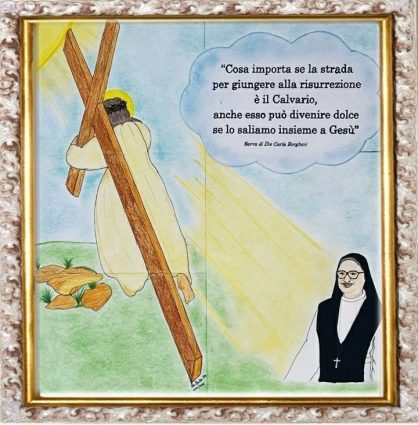 Just a few days ago, we commenced Lent, a favorable and graceful time. As Saint Paul exhorted us, let us not allow this time of grace to pass in vain, for now is the day of salvation (2 Corinthians 6:2).
Just a few days ago, we commenced Lent, a favorable and graceful time. As Saint Paul exhorted us, let us not allow this time of grace to pass in vain, for now is the day of salvation (2 Corinthians 6:2).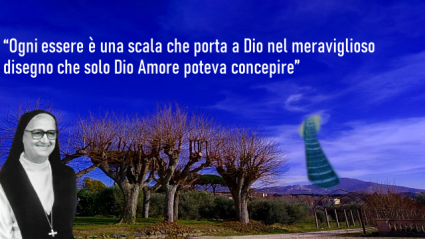 Il 17 febbraio del 1922 segna un evento speciale, nasce Madre Carla Borgheri!
Il 17 febbraio del 1922 segna un evento speciale, nasce Madre Carla Borgheri!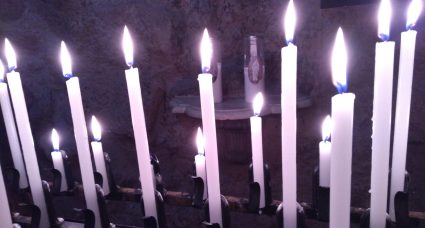 Voglio iniziare questa mia breve riflessione sulla festa della Candelora, proprio con queste parole del Vangelo di Luca, perché racchiudono l’essenza più vera e più profonda di tale ricorrenza. La Candelora cade il 2 febbraio, 40 giorni dopo il Natale di nostro Signore. È la festa liturgica della Presentazione di Gesù al tempio: infatti, compiuti i giorni della purificazione, come vuole la legge di Mosè, Giuseppe e Maria si recano a Gerusalemme per adempiere tale rito. Ed è qui che compare il vecchio Simeone, uomo timorato di Dio, a cui era stato predetto che non sarebbe morto, prima di vedere il Messia. La fede di Simeone è grande: anche se i suoi occhi sono vecchi e stanchi, ora vede, ora stringe tra le sue braccia il Figlio di Dio, lo riconosce. “Nunc dimittis”, queste le sue parole: ora può anche morire, perché la Luce è venuta nel mondo.
Voglio iniziare questa mia breve riflessione sulla festa della Candelora, proprio con queste parole del Vangelo di Luca, perché racchiudono l’essenza più vera e più profonda di tale ricorrenza. La Candelora cade il 2 febbraio, 40 giorni dopo il Natale di nostro Signore. È la festa liturgica della Presentazione di Gesù al tempio: infatti, compiuti i giorni della purificazione, come vuole la legge di Mosè, Giuseppe e Maria si recano a Gerusalemme per adempiere tale rito. Ed è qui che compare il vecchio Simeone, uomo timorato di Dio, a cui era stato predetto che non sarebbe morto, prima di vedere il Messia. La fede di Simeone è grande: anche se i suoi occhi sono vecchi e stanchi, ora vede, ora stringe tra le sue braccia il Figlio di Dio, lo riconosce. “Nunc dimittis”, queste le sue parole: ora può anche morire, perché la Luce è venuta nel mondo.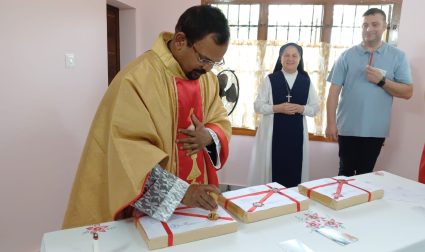 Desidero iniziare echeggiando le parole di Madre Carla: se ci fermiamo un momento a meditare sul mistero dell’incarnazione della parola, possiamo solo restare senza parole e in silenzio di fronte alla grandezza della Trinità; (frascati, 14 luglio 2003).
Desidero iniziare echeggiando le parole di Madre Carla: se ci fermiamo un momento a meditare sul mistero dell’incarnazione della parola, possiamo solo restare senza parole e in silenzio di fronte alla grandezza della Trinità; (frascati, 14 luglio 2003).
 Il percorso di Madre Carla ci sfida a esaminare le nostre vite e a considerare come anche noi possiamo contribuire al miglioramento del mondo che ci circonda, tratti dall’umiltà di Maria e dalla fiducia incrollabile di san Giuseppe. Celebrando oggi Madre Carla Borgheri, non stiamo solo onorando una figura storica, ma abbracciamo un esempio senza tempo di amore e compassione. Possa la sua beatificazione servire da richiamo all’azione per tutti noi, ispirando un impegno rinnovato al servizio, all’empatia e al desiderio di un mondo più giusto e compassionevole. Grazie, e che lo spirito di Madre Carla, guidato dall’amore della santa trinità, continui a ispirarci e guidarci tutti.
Il percorso di Madre Carla ci sfida a esaminare le nostre vite e a considerare come anche noi possiamo contribuire al miglioramento del mondo che ci circonda, tratti dall’umiltà di Maria e dalla fiducia incrollabile di san Giuseppe. Celebrando oggi Madre Carla Borgheri, non stiamo solo onorando una figura storica, ma abbracciamo un esempio senza tempo di amore e compassione. Possa la sua beatificazione servire da richiamo all’azione per tutti noi, ispirando un impegno rinnovato al servizio, all’empatia e al desiderio di un mondo più giusto e compassionevole. Grazie, e che lo spirito di Madre Carla, guidato dall’amore della santa trinità, continui a ispirarci e guidarci tutti.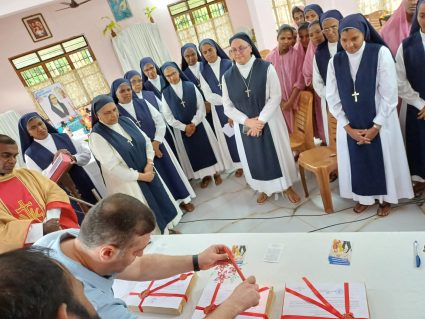 Dear Fathers, Sisters and Brothers in Jesus Christ, first of all, I Wish you a very happy feast.
Dear Fathers, Sisters and Brothers in Jesus Christ, first of all, I Wish you a very happy feast.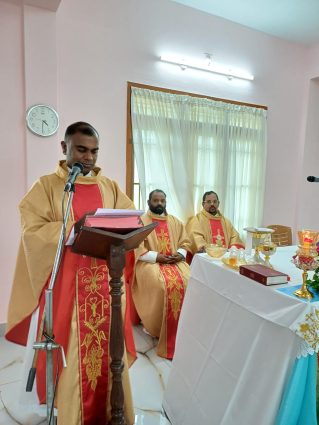
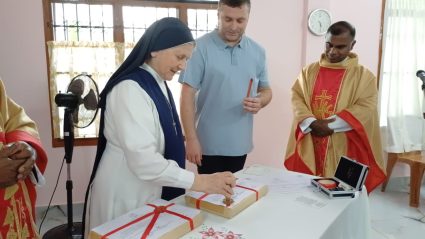
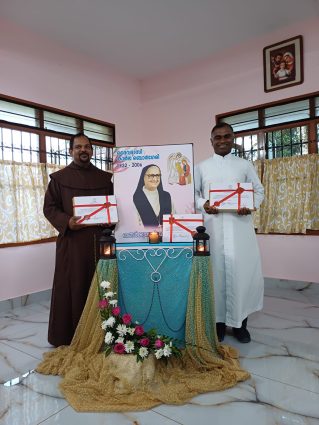
 Sono onorato di trovarmi davanti a voi oggi con profonda gratitudine e un profondo senso di rispetto mentre ci riuniamo per esprimere la nostra sincera gratitudine all’Arcivescovo Joseph. Apprezziamo di aver gentilmente accettato di presiedere l’indagine canonica per la causa di beatificazione dell’amata Serva di Dio Carla Borgheri. Esprimo inoltre la mia viva gratitudine a tutti i membri del Tribunale che hanno generosamente accettato di svolgere questo importante servizio ecclesiastico.
Sono onorato di trovarmi davanti a voi oggi con profonda gratitudine e un profondo senso di rispetto mentre ci riuniamo per esprimere la nostra sincera gratitudine all’Arcivescovo Joseph. Apprezziamo di aver gentilmente accettato di presiedere l’indagine canonica per la causa di beatificazione dell’amata Serva di Dio Carla Borgheri. Esprimo inoltre la mia viva gratitudine a tutti i membri del Tribunale che hanno generosamente accettato di svolgere questo importante servizio ecclesiastico.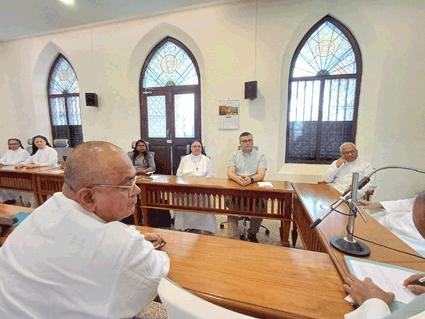 Apprezziamo la disponibilità encomiabile di tutti i membri del Tribunale, disponibilità a contribuire con la vostra esperienza e il vostro tempo allo studio della vita, delle virtù, della reputazione di santità e dei segni attribuiti a Carla Borgheri. La vostra dedizione a questa sacra causa incarna la vostra devozione al servizio di Dio e della Chiesa.
Apprezziamo la disponibilità encomiabile di tutti i membri del Tribunale, disponibilità a contribuire con la vostra esperienza e il vostro tempo allo studio della vita, delle virtù, della reputazione di santità e dei segni attribuiti a Carla Borgheri. La vostra dedizione a questa sacra causa incarna la vostra devozione al servizio di Dio e della Chiesa.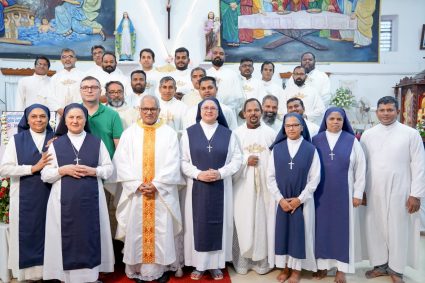 In a joyous commemoration at St. Raphael Church Thykoodam on January 13, 2024, the Missionaries of Incarnation recently marked a day of profound significance – the remembrance of the proclamation of Mother Carla Borgheri as the Servant of God. The morning session, enriched by the wisdom of Dr. Waldery Hilgeman, delved into the details of the canonization process, providing insights into the remarkable journey of Mother Carla. As the day unfolded, the evening saw a magnificent Eucharistic celebration at 4:30 pm, presided over by Monsignor Mathew Elanjimattam, the Vicar General of Verapoli Archdiocese.
In a joyous commemoration at St. Raphael Church Thykoodam on January 13, 2024, the Missionaries of Incarnation recently marked a day of profound significance – the remembrance of the proclamation of Mother Carla Borgheri as the Servant of God. The morning session, enriched by the wisdom of Dr. Waldery Hilgeman, delved into the details of the canonization process, providing insights into the remarkable journey of Mother Carla. As the day unfolded, the evening saw a magnificent Eucharistic celebration at 4:30 pm, presided over by Monsignor Mathew Elanjimattam, the Vicar General of Verapoli Archdiocese.  This sacred occasion was made even more beautiful by the significant collaboration among the Missionary Fathers of Incarnation and the Missionary Sisters of Incarnation. Their joint efforts created an atmosphere of unity, underscoring the shared commitment to honoring Mother Carla’s profound impact on the congregation.
This sacred occasion was made even more beautiful by the significant collaboration among the Missionary Fathers of Incarnation and the Missionary Sisters of Incarnation. Their joint efforts created an atmosphere of unity, underscoring the shared commitment to honoring Mother Carla’s profound impact on the congregation.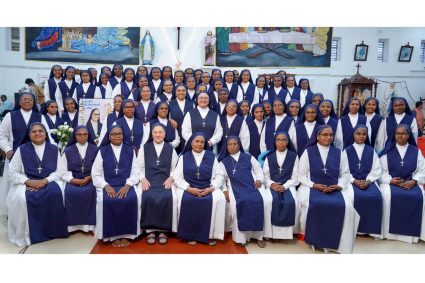 Distinguished guests, including Postulator Waldery, Mother General Carmela Cataldo, Vicar General Loreda Spagnolo, General Councillor Sr. Jessy Chenathara, and General Procurator Sr. Gracy Thayil, added to the solemnity of the event. Mother Carmela inaugurated the proceedings with the lighting of the lamp, setting the stage for an evening filled with inspiration and remembrance.
Distinguished guests, including Postulator Waldery, Mother General Carmela Cataldo, Vicar General Loreda Spagnolo, General Councillor Sr. Jessy Chenathara, and General Procurator Sr. Gracy Thayil, added to the solemnity of the event. Mother Carmela inaugurated the proceedings with the lighting of the lamp, setting the stage for an evening filled with inspiration and remembrance. 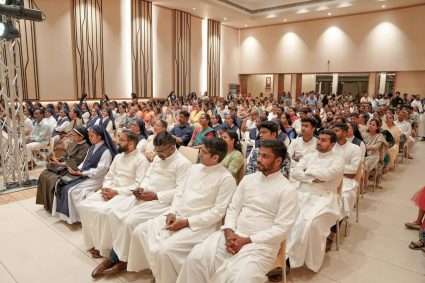 Father Joby, the parish priest, and Mr. Ooby, the Parish Council Secretary, graced the occasion with heartfelt valedictory speeches, emphasizing the impact of Mother Carla’s life on the community. Sister Loreda delivered a touching message that echoed the profound influence of Mother Carla Borgheri.
Father Joby, the parish priest, and Mr. Ooby, the Parish Council Secretary, graced the occasion with heartfelt valedictory speeches, emphasizing the impact of Mother Carla’s life on the community. Sister Loreda delivered a touching message that echoed the profound influence of Mother Carla Borgheri. A ‘New’ Year is a kaleidoscope of ‘new’—new days, new possibilities, and new connections with new faces. It invites us to embrace change, cultivate resilience, and approach each moment with a sense of wonder. As we stand on the threshold between the past and the future, the fading echoes of the year gone by mingle with the whispers of the adventures yet to unfold. It’s a moment where we honor the lessons learned and the growth achieved.
A ‘New’ Year is a kaleidoscope of ‘new’—new days, new possibilities, and new connections with new faces. It invites us to embrace change, cultivate resilience, and approach each moment with a sense of wonder. As we stand on the threshold between the past and the future, the fading echoes of the year gone by mingle with the whispers of the adventures yet to unfold. It’s a moment where we honor the lessons learned and the growth achieved. On this occasion of Christmas season, with great joy, we the Missionary Sisters of Incarnation together with our inmates and their family members and our benefactors, celebrated the Christmas program at St. Charles Home, Tamil Nadu on 22nd Dec at 11.30 am. We invited Rev. Fr. Madhan, the correspondent of Bishop Arockiaswamy B.Ed. College as our Chief Guest and Paster Stephen, the Paster of Sahaya Nager AG Church and Mr.Vijai, Sub Inspector of Rajakamangalm who were our Special Guest.
On this occasion of Christmas season, with great joy, we the Missionary Sisters of Incarnation together with our inmates and their family members and our benefactors, celebrated the Christmas program at St. Charles Home, Tamil Nadu on 22nd Dec at 11.30 am. We invited Rev. Fr. Madhan, the correspondent of Bishop Arockiaswamy B.Ed. College as our Chief Guest and Paster Stephen, the Paster of Sahaya Nager AG Church and Mr.Vijai, Sub Inspector of Rajakamangalm who were our Special Guest.  All our Chief Guests and Special guest were impressed by the cheerfulness and the programs of our dear children who are intellectually Disabled. This is the joy that we must learn from these special children and bring to others. Through the programme, we could see the possible effort and the dedication of all the sisters and the staff who are involved in their growth and education. We thank all our well-wishers, friends and relatives. May the infant Jesus bless you all and give you peace, joy and prosperity through this great festival of Christmas.
All our Chief Guests and Special guest were impressed by the cheerfulness and the programs of our dear children who are intellectually Disabled. This is the joy that we must learn from these special children and bring to others. Through the programme, we could see the possible effort and the dedication of all the sisters and the staff who are involved in their growth and education. We thank all our well-wishers, friends and relatives. May the infant Jesus bless you all and give you peace, joy and prosperity through this great festival of Christmas.